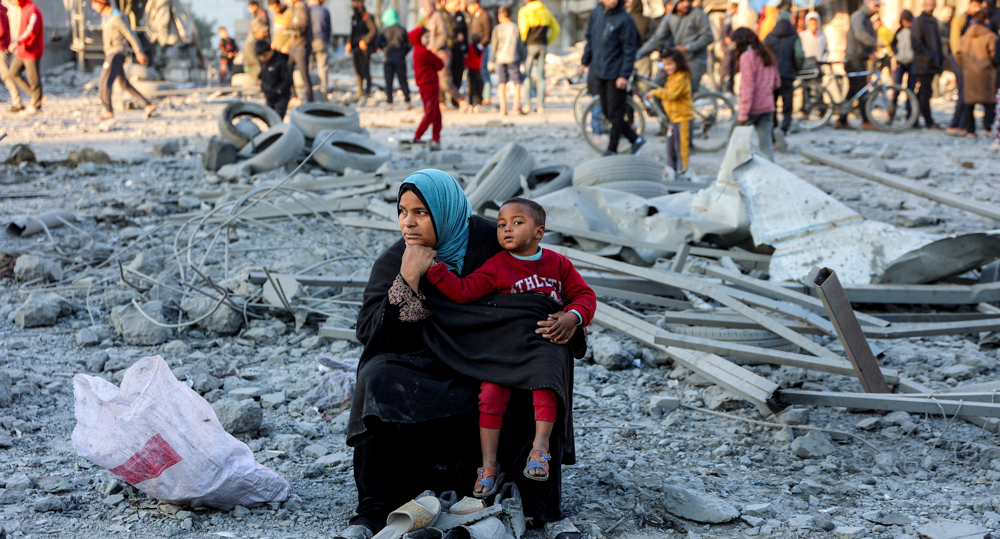Israel bans female Palestinian activist from entering al-Aqsa amid more arrests
Israeli forces have banned a Palestinian female teacher and activist from entering the al-Aqsa Mosque for six months in the occupied Old City of East Jerusalem al-Quds amid escalation of violence by the Israeli forces and settlers against Palestinians.
Hanadi al-Halawani, who oversees the Islamic sites at the sacred compound, was initially arrested at Bab al-Asbat near the Aqsa Mosque by the Israeli forces, the Palestinian Information Center reported Sunday.
Reacting to her detention, Halawani said, “Nothing is more upsetting than the occupation’s control over a sacred part of your land, ordering and choosing who can or cannot enter it,” adding, “Just like a thief who stay in your house against your will and then force you to leave it.”
Halawani has voluntarily remained at the Aqsa Mosque to watch over it in an effort to protect it against Israeli intents to Judaize the holy site.
She had also previously been banned from entering the mosque for an entire week.
In recent years, dozens of Palestinian worshipers, including senior clerics were among the Palestinians who were banned from entering al-Aqsa mosque compound in East Jerusalem al-Quds. Palestinians say the ban is a form of punishment by the Israeli authorities that is aimed at keeping them away from their holy site.
Palestinians have repeatedly warned of Israeli attempts to change the status quo of the al-Aqsa compound, the third holiest site in Islam.
It comes at a time of rising tensions between Israelis and Palestinians in the wake of prime minister Benjamin Netanyahu's intention to annex parts of the occupied West Bank.
The occupied Palestinian territories have also witnessed tensions since US President Donald Trump announced his decision on December 6, 2017 to recognize Jerusalem al-Quds as Israel’s capital and relocate the US embassy from Tel Aviv to the occupied city.
On December 21, 2017, the United Nations General Assembly overwhelmingly voted in favor of a resolution that calls on the US to withdraw its controversial recognition of the occupied Jerusalem al-Quds as Israeli “capital.”
In an attempt to prevent the passing of the resolution, Trump threatened reprisals against countries that backed the measure, which had earlier faced a US veto at the UN Security Council.
Israel rejected the UN resolution while thanking Trump for his decision to move the US embassy to the occupied Jerusalem al-Quds.
Israeli forces kidnap more Palestinians
Meanwhile, the Israeli military has kidnapped at least three Palestinians during a series of raids across the occupied Palestinian territory.
Local sources in the West Bank city of Bethlehem said Israeli forces abducted two young men after breaking into their homes in Beit Fajjar town on Sunday.
A young Palestinian man, Mahmoud al-Rajabi, was also taken away by the Israeli troops at the main entrance to Issawiya district, east of Jerusalem al-Quds.
Israeli forces have been carrying out similar raids in the occupied territories on an almost daily basis. The raids have intensified since the deadly war on the Gaza Strip last year.
Israel holds more than 7,000 Palestinians in its jails. Most of the prisoners are being held with no indictment or trail, a controversial policy known as administrative detention.
Human rights groups have criticized Israel for rampant rights abuses in jails and reports of mysterious deaths of Palestinian inmates.
Israeli forces routinely abduct Palestinians in the West Bank and put them behind bars based on the controversial administrative detention policy.
Administrative detention is a sort of imprisonment without trial or charge that allows Israel to incarcerate Palestinians for up to six months. The detention order can be renewed for indefinite periods of time.
Hamas thanks Iran, Resistance Front following achievement of ceasefire in Gaza
'Capitulation': Israeli officials and media concede Gaza defeat as truce unfolds
'Gaza has won': Social media users react to ceasefire with mix of relief, joy
Iran seeks South Korea’s assistance for AI, fiber-optic projects
VIDEO | Iran's 'Eqtedar' (Power) maneuver
Israel hits HTS military target in Syria for 1st time since fall of Assad
VIDEO | Press TV's news headlines
Israel has slaughtered 13,000 students in Gaza, West Bank













 This makes it easy to access the Press TV website
This makes it easy to access the Press TV website